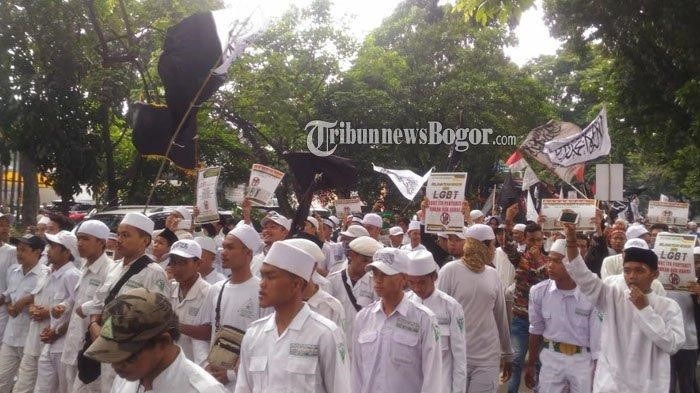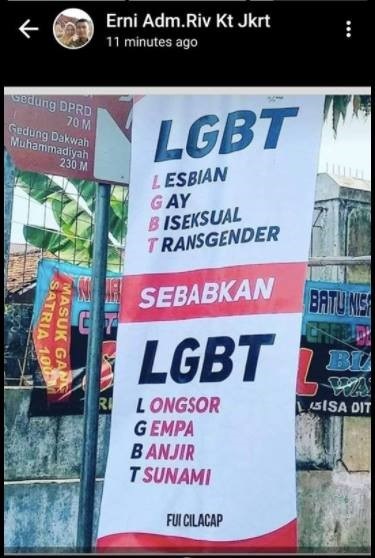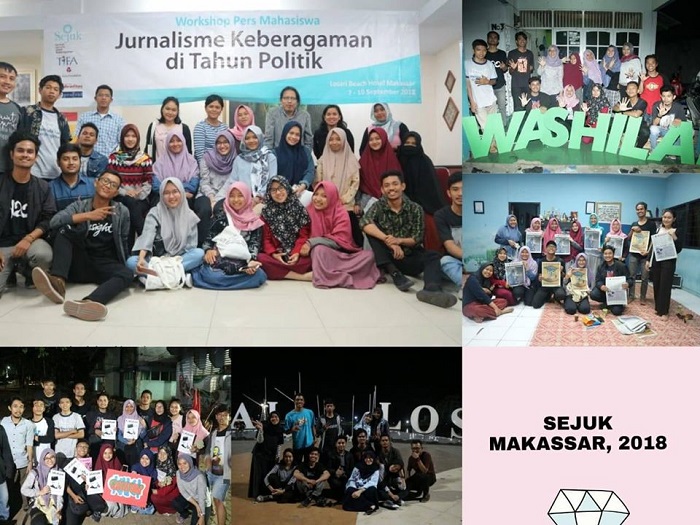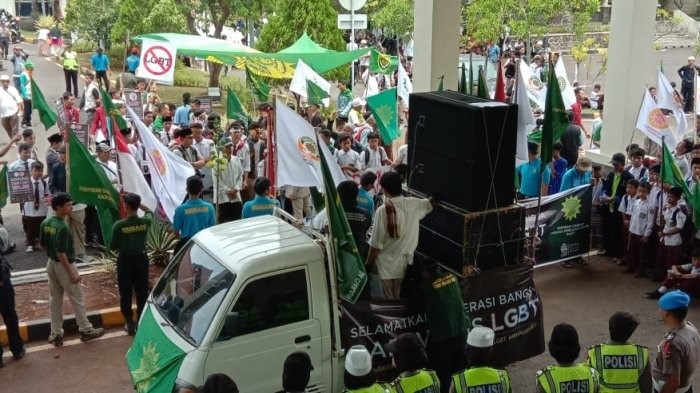News media has helped drive a dramatic rise in online anti-LGBT hate speech
Versi Bh. Indonesia
Dina Listiorini
Between January 2016 and December 2018 Indonesia’s online media saw an unprecedented rise in anti-LGBT hate speech and an extraordinary level of coverage of LGBT issues more broadly – a sign of the intensity of debate on the subject. During this time, a simple search revealed that news site detik.com had posted no less than 1025 mentions of LGBT. Another mainstream news source, kompas.com, had used the term LGBT 6730 times in various stories in the same period.
Before January 2016, very few Indonesians had heard of the acronym LGBT, let alone knew what it referred to. Indeed, there was limited mainstream media coverage of LGBT matters and the topic generally only received media attention during specific events such as HIV or condom awareness programs. But by December 2018 the media was taking full advantage of the clicks it would attract by merely mentioning LGBT. As a result, few Indonesians can now say they have never heard of the term LGBT.
The media in Indonesia did, however, cover some queer issues before January 2016. For instance, there were frequent discussions about waria (trans women) and their work in the entertainment world, including being actors, singers and models. There was some hate speech surrounding waria, but not to the extent witnessed post January 2016. There were jokes in the media about certain people being gay, and even suggestions that gay people had no place in Indonesia, but there was no concerted push to attack or criminalise LGBT communities. Sadly, in January 2016, the media began to fill with hate speech against LGBT Indonesians.

It is striking that the rise of anti-LGBT hate speech came about during the presidency of the supposedly reformist Jokowi. Prior to this time, such harsh moral judgements had usually been carried out by conservative Islamic organisations, such as Muhammadiyah, Nahdlatul Ulama and Majelis Ulama Indonesia (the government-endorsed Council of Islamic Scholars). The fact that Jokowi made no effort to restrict hate speech espoused by influential religious organisations had a disastrous impact on the lives of LGBT Indonesians.
In exploring how the media helped bring about this LGBT crisis, I found five main ways that the Indonesian media framed discussion of the topic.
Immorality
The first way the media fuelled the crises was by framing LGBT people as immoral human beings. Phrases such as ‘LGBT behaviour violates religious values,’ and ‘LGBT are endangering the nation,’ were consistently used in media reporting. ‘LGBT are a common enemy which must be defeated,’ and ‘LGBT have no right to live in Indonesia’ were also common. (Note, the term ‘LGBT’ is used as a noun in Indonesian to mean the communities, the identity and/or the broader topic itself.)
Many news sources used these types of inflammatory headlines, including detik.com, tribunnews.com, okezone.com, viva.co.id, kapanlagi.com, and Antara online news. Worryingly, the national public broadcaster also used such titles on rri.co.id. Needless to say, religious-based online news portals such as arrahmah.co.id, eramuslim.com, voa-islam.com, and hidayatullah.com also used provocative headings and published anti-LGBT stories lacking substance.
Derogatory language
Second, through consistently attaching derogatory words and phrases to LGBT people and their actions. For instance, media coverage repeatedly used words such as dangerous, attack, sinner, immoral, ‘not human’ and ‘should be banned’. On 24 January 2016, for example, republika.co ran the headline ‘LGBT are a serious threat.’ This violates the journalistic code of ethics, but no sanctions were applied. The media also ran stories about (or at least using the term) ‘gay sex parties’ to further discredit the LGBT community in the eyes of many in their audience.
Images
Third was through the use of images. The media frequently embellished their derogatory stories with photos of protestors holding anti-LGBT signs. For instance, tribunnews.com, republika.com, detik.com and liputan6.com posted numerous photos of Islamic groups holding signs espousing hatred of LGBT people and communities.
Natural disasters
The fourth way was through claiming that LGBT people were the cause of natural disasters. After the 2018 Central Sulawesi earthquake, for instance, which caused a devastating tsunami that hit Palu and Donggala, numerous media sources reported that the catastrophe had been caused by LGBT. To support this ludicrous statement, many Indonesian media outlets invited international guests to comment. This included newsokezone.com interviewing Ghanaian religious leader Mallam Abbas Mahmud; CNN Indonesia interviewing former deputy prime minister of Malaysia Ahmad Zahid Hamidi; and BBC Indonesia interviewing American priest Tony Perkins, all who supported the notion that LGBT communities caused the earthquake and tsunami. When these interviews went viral through Whatsapp, many Indonesians believed what was being said.

One-sided
The fifth way the media fuelled the crises the media framed LGBT issues to intentionally bring about the current crisis was by selecting only certain voices to talk on the issue. The media specifically chose to interview people with fearful and negative views regarding LGBT people in order to cause controversy and increase ratings. They knew that the commentators they invited to speak would say inflammatory things, and that’s why they invited them.
Between 2016 and 2018, the media frequently interviewed people from Islamic political parties such as Tifatul Sembiring and Jazuli Juwaini from PKS (Partai Keadilan Sejahtera, the Prosperous Justice Party), Arsul Sani and M Romahurmuziy from PPP (Partai Persatuan Pembangunan, the United Development Party), and politicians from the House of Representatives such as Zulkifli Hasan and Marwan Dasopang. These people accused LGBT people of everything from being dangerous criminals and disease spreaders to causing disasters, terrorism and the drug epidemic. Politician Aboe Bakar Alhabsy even said that LGBT people were a more dangerous threat to Indonesia than either terrorism or drugs. Ma’ruf Amin, Jokowi’s vice president for his second term, said in 2016 that new laws were needed to criminalise LGBT.

With such an uncritical media dominating the Indonesian news, it is understandable that everyday Indonesians begin to believe the harmful claims made about LGBT people and communities. We need to continue fighting to ensure LGBT people are accepted in Indonesia.
There is some hope though. The Alliance of Independent Journalists (Aliansi Jurnalis Independen, AJI) and the Union of Journalists for Diversity (Serikat Jurnalis Untuk Keberagaman, SEJUK) are now providing training for journalists. This training covers ways to sensitively cover issues concerning sexual minorities. Hopefully, journalists who complete such training can report in sexual minorities in a more inclusive way, without stigmatizing or judging.
Since I completed my research, Tempo.co has changed the ability of people to search articles related to LGBT. I contacted Tempo.co directly in November 2019 and was told that it is now impossible to search articles using the keyword “LGBT” as a generic tag.
Dina Listiorini (dinalisty@gmail.com) is a PhD candidate in the Department of Communications at Universitas Indonesia.












